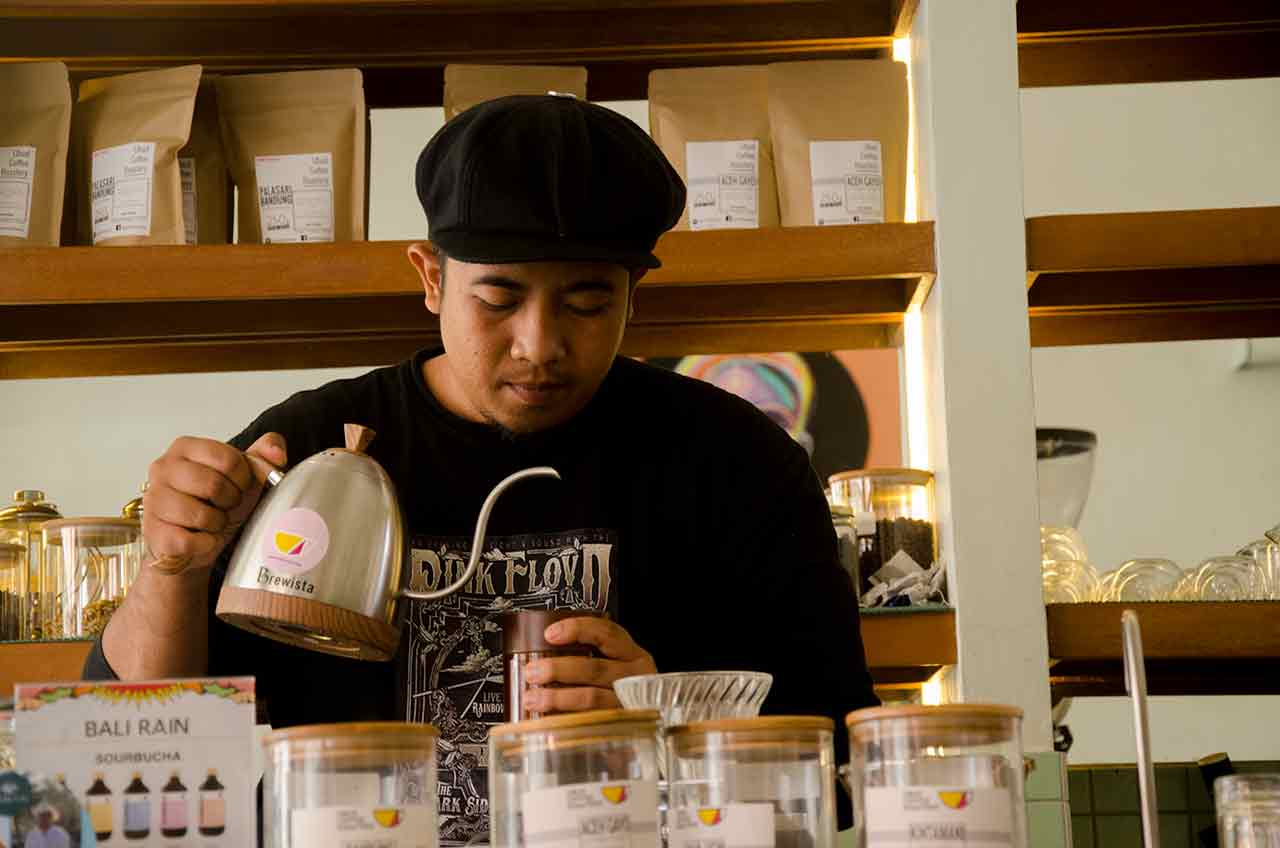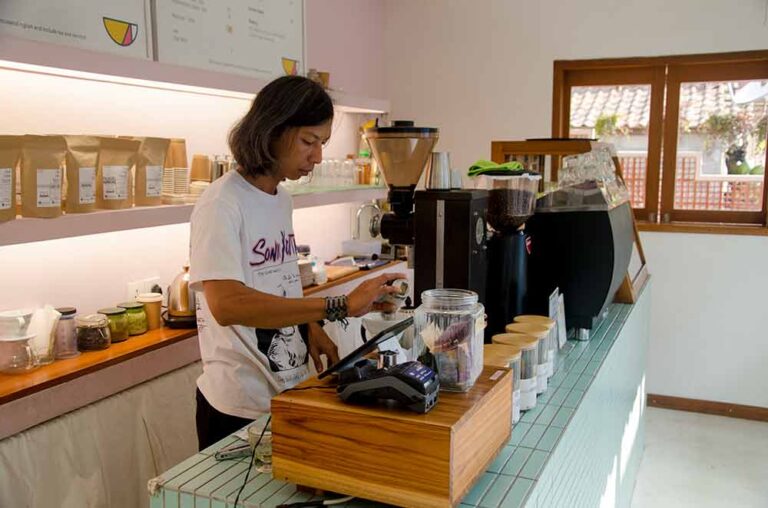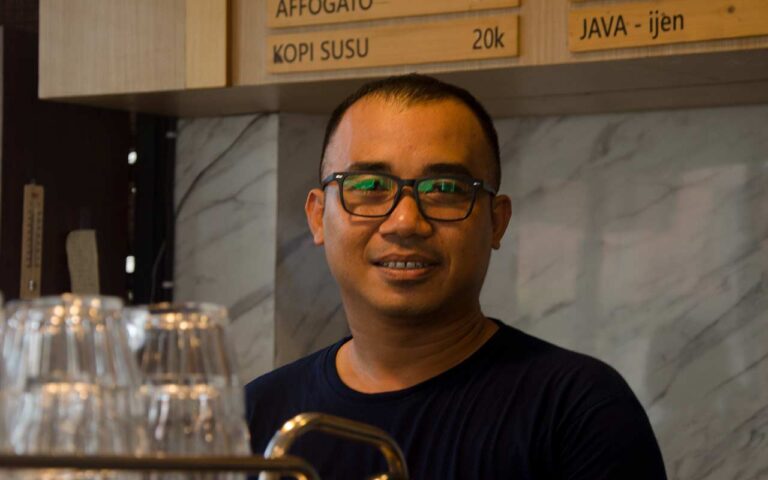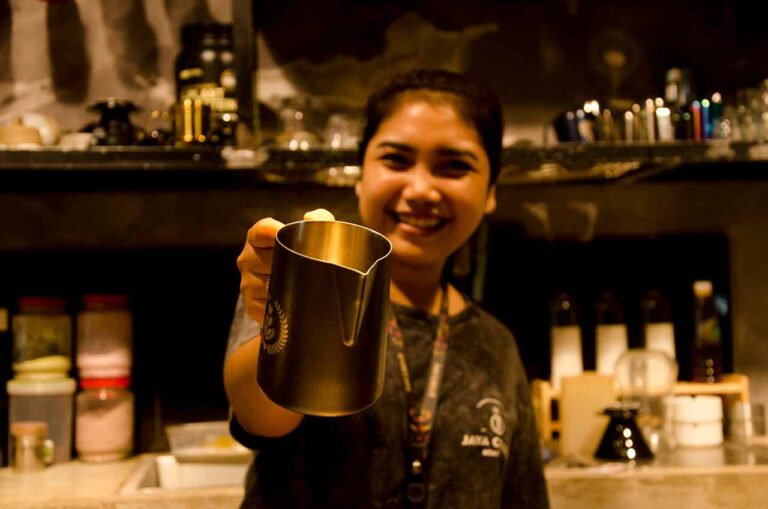Dewas gently shook the clear glass in his hand with a slight circular motion. The coffee he had just brewed swung along the walls of the glass as if it were about to jump out of the slightly convex-shaped glass vessel. A moment later, he slurped with a loud slurp.
“The body is soft, the aroma is really delicious, but the flavor is too funky or overfermented, making the stomach feel uncomfortable,” he said, describing the impression he got.
We chatted lightly in the corner of the coffee shop, which was quite busy that afternoon.
Dewas is a barista who works at Ubud Coffee Roastry, a coffee shop in the center of Ubud. That’s a shortened form of his full name, Bagus Satria Wibawa. This sad-eyed young man was born in Madiun, right at the end of January 1991.
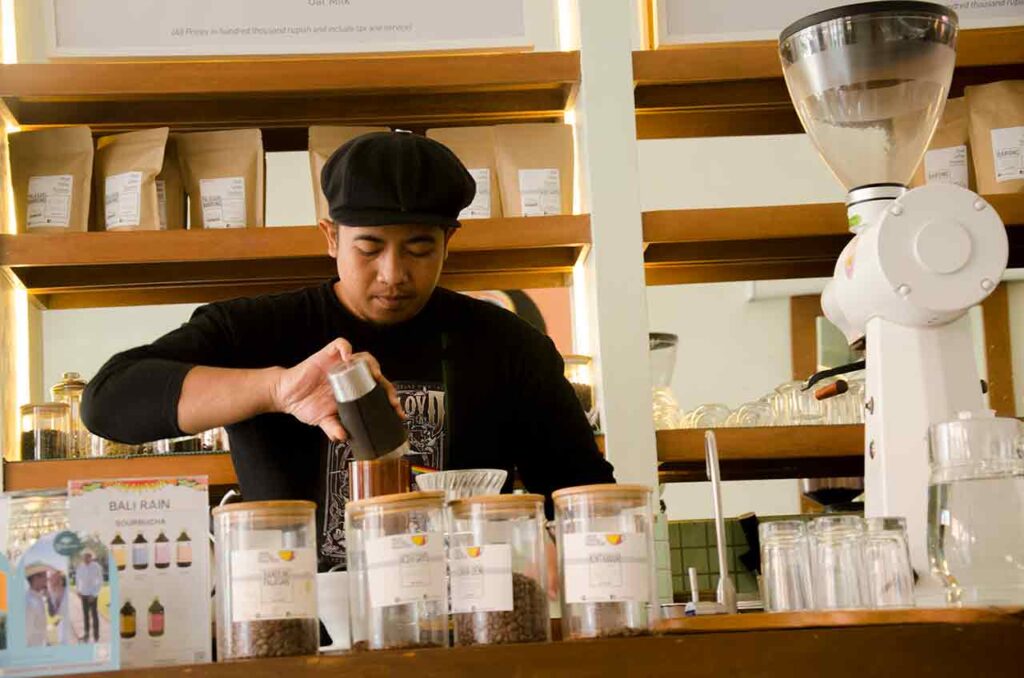
Wearing a black t-shirt with a decorative picture of the band Pink Flyod and a black flat cap on his head, Dewas appeared casual, like a young painter artist. That afternoon, he was tasting coffee made from beans roasted by his colleagues. They just get natural-process coffee beans from partner coffee processors. Before selling to customers, roasting staff and baristas must calibrate to ensure the best taste of coffee beans can be produced.
Dewas realizes that one of his roles as a barista is to provide feedback to the roasting staff so that the taste of the coffee can be maintained consistently according to customer expectations.
He never imagined how he could plunge so deeply into the world of coffee.
It all started with a traumatic event in 2016 which caused deep sadness. His father died of a heart attack while drinking sachet coffee at a grocery shop next door.
“I tidied up things, such as bag, cigarettes, and the rest of the coffee in the glass my father was drinking at the shop,” he recalled with a sad expression.
When preparing for a funeral ceremony, it is a tradition in Bali to serve coffee to the mourners. Dewas did not dare to look at, let alone approach, the glasses of coffee being served. He really hated coffee.
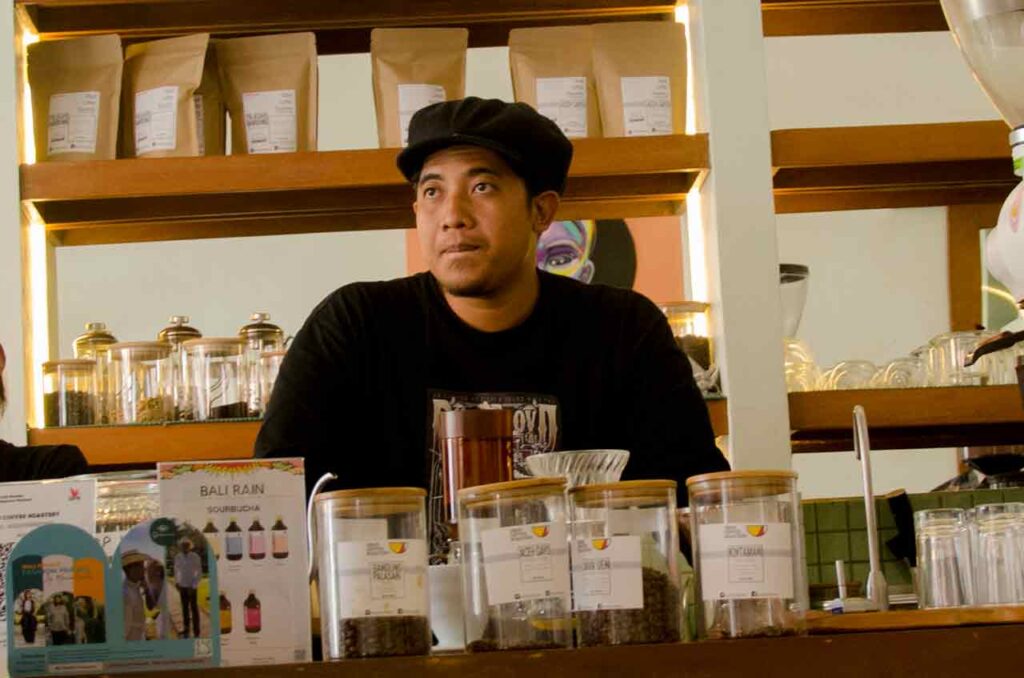
After studying at Atma Jaya Yogyakarta in 2009, majoring in accounting, Dewas actually enjoyed working on cruise ships as a bar waiter. However, because his two older brothers had careers in Jakarta and Medan, after his father died, he chose not to continue working outside Bali. He decided to accompany his mother, who lived alone at home.
Coincidentally, a friend who owns a resort in Ubud offered him a job as Guest Relations. There he often saw the barista preparing coffee for guests in the restaurant, which was not far from the lobby where he welcomed guests.
Time goes by slowly. Curiosity began to arise as to why coffee could cause his father to die. He started actively looking for it.
He was determined to find out about coffee directly from the source, even though he didn’t know who is to ask.
Until one morning, with a friend, he decided to go to the Kintamani area, Bangli, which at that time was already known as a coffee producer. Even though the sky was not very bright at that time and gray clouds covered the Ubud area, Dewas continued to ride his motorbike.
After approximately an hour’s drive, they entered the Kintamani area. When they passed through the gate that read “Welcome to the Mengani Coffee Garden Tourism Village”, they believed they were in the right direction. However, the clouds in the sky were getting thicker and drizzle of rain began to fall. They decided to look for shelter.
Ahead, a large building caught their attention, perhaps they could take shelter there. Unexpectedly, from that direction a man called out inviting them to stop because he saw they were caught in the rain.
His name is Mr Hendarto. Apparently, he is a coffee entrepreneur. It was a happy coincidence for Dewas, because he met the right person to find out many things about coffee. Mr Hendarto Setyabudi is very friendly and enjoys sharing stories about the world of coffee.
The cool air of the highlands of Mengani Village, laced with the sound of rainwater, feels so peaceful. Their conversation was paused for a moment when Mr. Hendarto’s wife served him a warm drink that smelled of jasmine.
“Have a drink, please,” said Mr. Hendarto’s wife.
Dewas imagines that warm jasmine tea is very delicious to sip in rainy day like this. Having just taken a sip while enjoying the fragrance of jasmine, Dewas gasped as his tongue tasted the soft sweetness and rose-like hint. He spontaneously asked what tea the host was serving.
“That’s coffee. Not tea,” replied Mr. Hendarto, laughing.
Dewas was shocked. Suddenly, he put away the cup he had just sipped from. He really had no intention of drinking coffee again since his father’s death. He just wanted to know about coffee. Not drinking it.
“I don’t dare drink coffee, sir!” he stammered. Dewas told of the traumatic incident that happened to his father.
“Sachet coffee is not real coffee, but more coffee essence, flavoring, and sugar,” explained Mr. Hendarto. What has just been served is original coffee from the garden in Mengani.
Mr. Hendarto slowly explained the difference between real coffee and sachet coffee. How sachet coffee can have a uniform taste and contain addictive substances. No wonder his late father used to have a habit of drinking up to 8 glasses of coffee a day.
Dewas could no longer hold back his tears. He felt sorry because he didn’t have the opportunity to introduce this authentic and delicious coffee to his father.
It doesn’t feel like time goes by so fast. They said goodbye to go home when the clock showed 11 o’clock at night. They’ve been there since 10 am.
Before going home, Mr. Hendarto advised Dewas to find out about coffee at the Coffee and Cocoa Research Center (Puslitkoka) in Jember, East Java. He also suggested meeting his acquaintance, Mr. Nabiel, owner of the Ubud Coffee Culture Shop in Ubud.
At Puslitkoka, he had the opportunity to study with one of the researchers. Generously explains the various substances contained in coffee. Also, a big picture of the coffee business. This helped him to have a more critical view of the coffee industry.
Likewise with Mr. Nabiel, apparently a figure who later contributed greatly to the development of his knowledge and skills in the field of coffee. Pak Nabiel was the one who then became a mentor from 2017 until he moved to Yogyakarta in 2019.
“Mr. Nabiel is a very kind person, he is like family to me. He is very open to people like me who want to learn about coffee,” said Dewas.
“I was trained to exercise my sensory sensitivity until I got bored,” he recalled with a chuckle.
Under Mr. Nabiel’s mentoring, Dewas gradually learned to recognize techniques and methods for brewing coffee and how to hone the sensory sensitivity of his sense of smell and taste. But more than that, he has a place to ask questions to understand the coffee process chain from upstream to downstream more fully. It’s not easy to become a complete barista.
In order to fulfill their high desire to learn about coffee, together with Gusti Ngurah Agus, a friend who is usually called “Meng”, they initiated a sharing community between coffee activists called “Ubud Coffee Weekend”. This community regularly gathers once a month, sharing knowledge and learning together about coffee.
“We were covered on national television. That’s what made us known not only in Ubud but throughout Bali,” he recalled.
Dewas and coffee activists at that time dreamed of a forum for players in the coffee business to develop themselves and share insights, especially in understanding coffee. We also want to show Ubud not only as a cultural center but also a fun coffee spot.
“I often meet baristas who, when asked where the coffee they are serving comes from, answer that it is from the supplier,” he said, shaking his head.
If only the majority of coffee industry players in Ubud, from baristas, roasters, to business owners had a unified understanding of Balinese coffee, Ubud would be increasingly known as a place for good quality coffee.
Unfortunately, since the Covid 19 pandemic, community activities have stopped until now.
That afternoon the sun looked hot outside. The glare shined through the glass window. The atmosphere in this coffee shop is getting busier. It seems that many visitors want to drink coffee while taking a break from the sun.
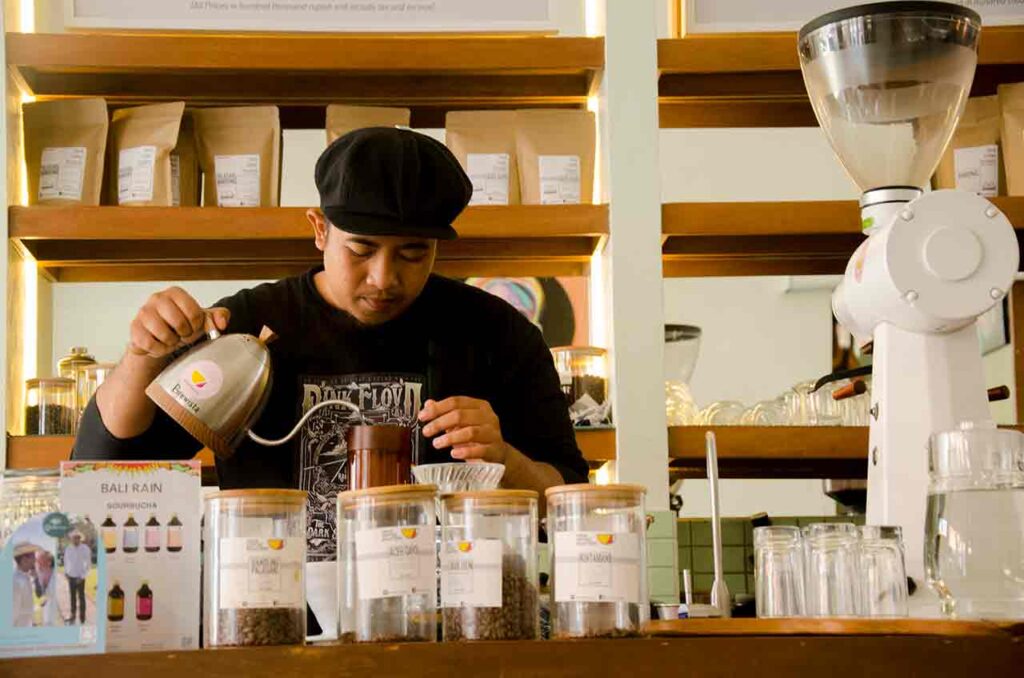
Dewas really enjoys everyday life at his current workplace. He likes the coffee shop concept which focuses on a coffee menu that maintains quality. At Ubud Coffee Roastery he felt he could wholeheartedly embrace anything about coffee.
Having idealism is not easy. Often you have to bet on the very dynamic realities of life. Dewas realized that. Because he felt the strong attraction between the two of them.
This barista, who once opened a coffee shop called “Mokapot”, doesn’t want to repeat the mistake; it doesn’t have a strong enough concept for the coffee shop. So it is often tempting to follow market desires, which often change. The coffee shop seemed to be adrift; it was difficult to maintain firm branding until finally it couldn’t survive. Bankrupt.
The fun chatter that afternoon sometimes had to compete with the sound volume of the grinder on the barista’s table, which was crushing the coffee beans into powder. Because it is easier to extract delicious coffee from crushed coffee beans than whole ones.
The ups and downs of life that sometimes feel heartbreaking actually become important capital for Dewas to pursue his dreams. One of them is creating a platform to follow his passion in order to learn more about the world of coffee. Especially the various coffees in the archipelago, which really deserve appreciation. Even though he is well aware that living with idealism is not easy.
For Dewas, a life that is too flat is like boring-tasting coffee. Occasionally, it needs to be shaken, rotated, climbed over the upper boundary walls. Until the aroma and taste awaken from their sleep in the subconscious.

